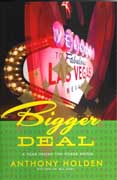
Bigger Deal: A Year Inside the Poker Boom
Holden's 'Bigger Deal'; Poker Handbook; Tourney Craps Get Spotlight
In 1990, Tony Holden wrote his classic look behind the scenes of poker, Big Deal. His update (answering what has happened since and how the game has changed) is the focus of Bigger Deal: A Year Inside Howard Schwartz, the "librarian for gamblers," is the marketing director for Gambler's Book Club in Las Vegas, a position he has held since 1979. Author of hundreds of articles on gambling, his weekly book reviews appear in numerous publications throughout the gaming industry. Howard's website is www.gamblersbook.com the Poker Boom (291 pages, hard bound, $26).
Howard Schwartz, the "librarian for gamblers," is the marketing director for Gambler's Book Club in Las Vegas, a position he has held since 1979. Author of hundreds of articles on gambling, his weekly book reviews appear in numerous publications throughout the gaming industry. Howard's website is www.gamblersbook.com the Poker Boom (291 pages, hard bound, $26).
Too, the home poker game has changed in the past decade, as more players are created at the Saturday Night “smokers” and to update this new generation, John Bond and Roy Cooke have produced their Home Poker Handbook (239 pages, paper bound, $14.95).
Finally, like a “long time-no see” friend, we have the classic (by the late Perry Moskowitz) that was one of the great breakthrough books ever on the subject (in the 1980s), available in its original form at Gambler’s Book Shop. Titled Winning Tournament & Casino Craps for the Systems Player (28 pages, paper bound, $4.95), this breakthrough book originally sold for $25.
Holden’s Bigger Deal examines the explosion of poker (assisted by the Internet and television), the World Series of Poker (approaching 9,000 entries this year and more than $12 million in prize money to the winner alone).
The brilliant Brit with wit, who plays and writes equally well (a rare mixture today) chronicles his own experiences, observations and opinions in Las Vegas and internationally. He writes of the innovators (Henry Orenstein whose invention allows us to see the players’ hand on TV); the authors; the players, the rascals, the gifted ones, the jerks and the characters. One of the more fascinating profiles focuses on 2006 World Series of Poker winner Jamie Gold, a 36-year-old TV agent-turned-producer from Malibu, CA., (His mother is a lifelong poker player, his grandfather a gin rummy ace.) and how his game was “refined” by WSOP champion Johnny Chan.
This is one book I’d read if I were planning a career as a poker pro, a move to Las Vegas or a cruise ship trip for smooth sailing, smooth reading.
Cooke and Bond have collaborated on a half-dozen books including the Real Poker series and Cooke’s Rules of Real Poker.
In 17 major sections the duo explains how to find and start a home game; what equipment you’ll need (tables, chairs, cards, chips); how to run the game (rules, credit, banking, game selection, expenses, detection of cheating); etiquette (including smoking, swearing, phones); the basic games including the stud games, split games, lowball, hold ‘em; Omaha.
Also, characteristics and variations of the games get consideration, games such as wild cards; kill games; roll your own; side bets; forced betting; chips declare; variations of stud games like Canadian and Mexican stud; Chicago; Black Mariah; Baseball; Pass the Trash
The book discusses board games like Cincinnati; Pineapple’ Crazy Pineapple; Wings; Wheel and Red/Black.; moves to closed (draw games) like Spit in the Ocean and Rockcrusher; to wilder games like Three-Card Monte; No Peek; Night Baseball; Seven/Twenty Seven; Guts; Boure; Chinese Poker.
The authors detail how to set up home poker tournaments (11 pages on this key section); house games as a business (including security; legal issues; dealing; cheats, game selection; protecting your players); the transition from home game to public poker; playing on the Internet. The book includes a valuable six-page listing of poker web sites—people, places, information resources including a 10-page section on playing on the Internet.
Well-structured, packed with fresh information for the 21st Century player, it’s as good as it gets for home players who may wish to venture beyond eventually.
In the 1980s, little was known about the “correct” strategy for those who played tournament craps. Then came Moskowitz’s Winning Tournament & Casino Craps for the Systems Player. For $25 (a lot more money than most books sold for 25 years ago), you’d know what the true pros knew. Now Gambler’s Book Shop has a limited number of this great classic, and it’s selling for $5, because many now know the secrets, yet some do not.
This simple, but powerful package focuses on systems for minimizing losses and maximizing gains. These include concepts such as Don’t Pass and Come Bets for Profit (a hedge system); Don’t Pass and Place Bets for Profit (a hedge system); How to Bet Hard Ways to Reduce Casino Advantage; betting 11 or 3 for profit; betting 12 or 2 for profit; how to bet field, place, don’t pass for profit; how to hold dice to make points; money management including determining amount to gamble.
The tournament craps section begins on page 17. It covers the difference between tournament and casino craps including when to increase your bets and the importance of noting time remaining to play; aggressive vs. conservative betting; hedge systems to use; how to catch the leader and how to prevent number two from catching up. One section focuses on the final round, while incorporating various systems; a strategy to annihilate your opponents and one to applying in the final five minutes.
If you plan to play in a craps tournament or want to improve your game, this little package of advice cannot be beaten for the price.
